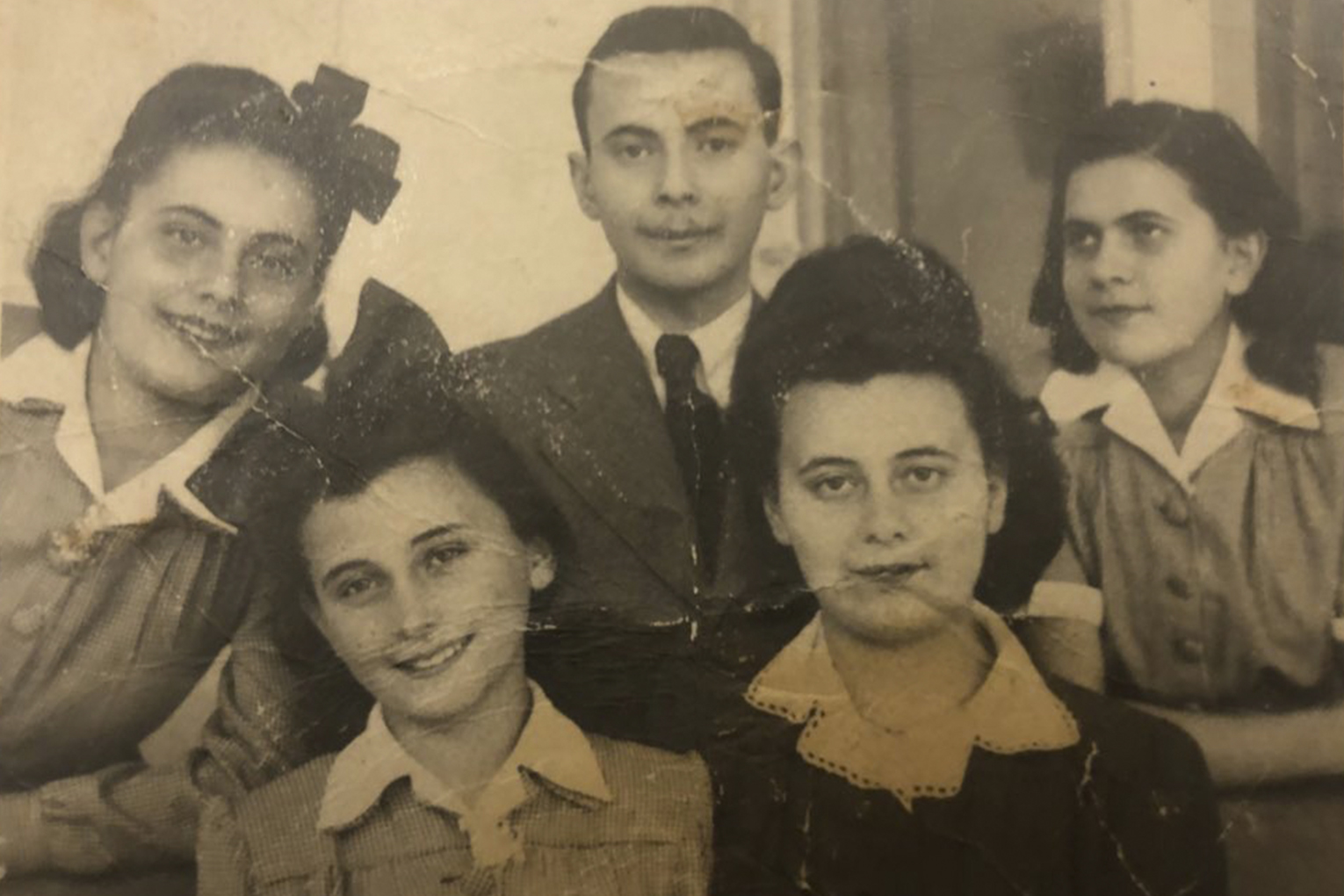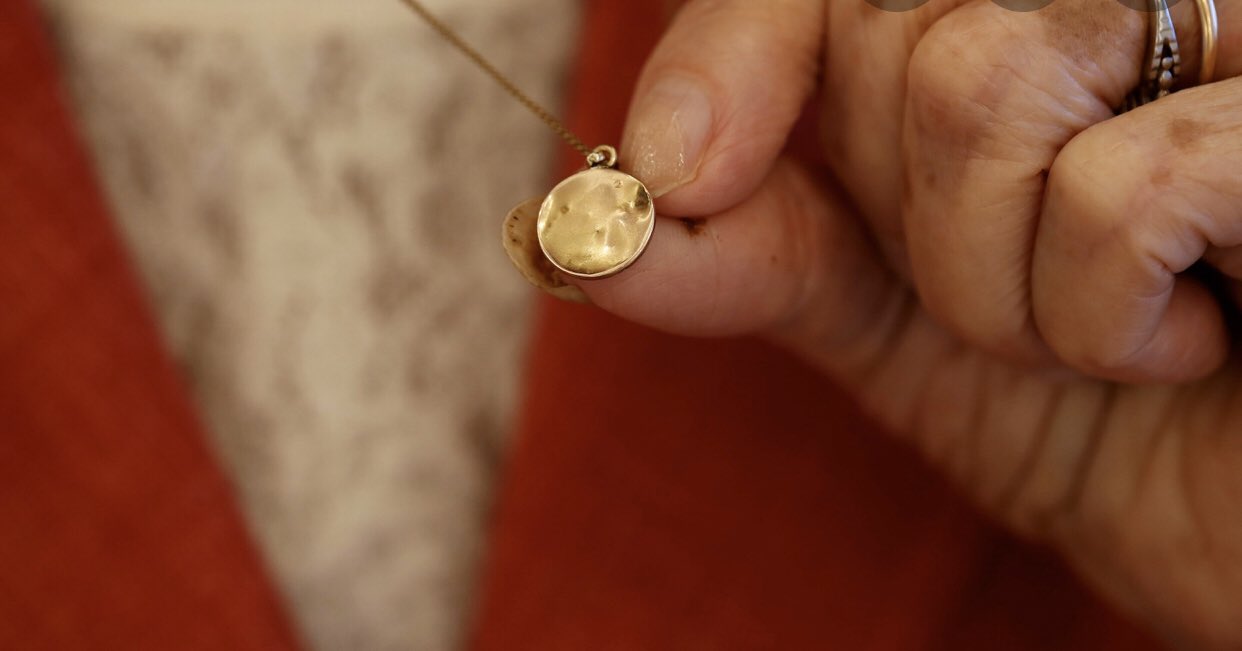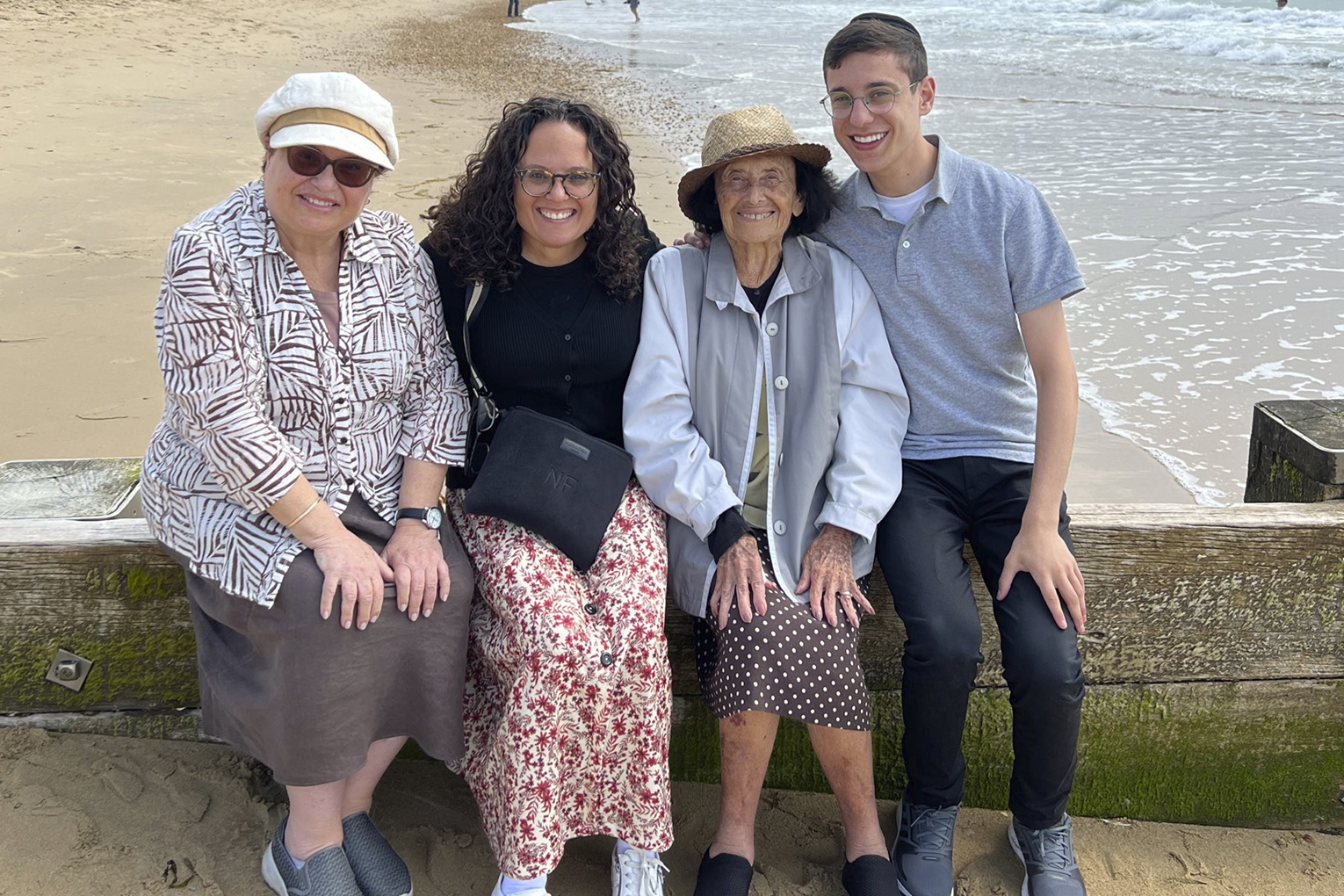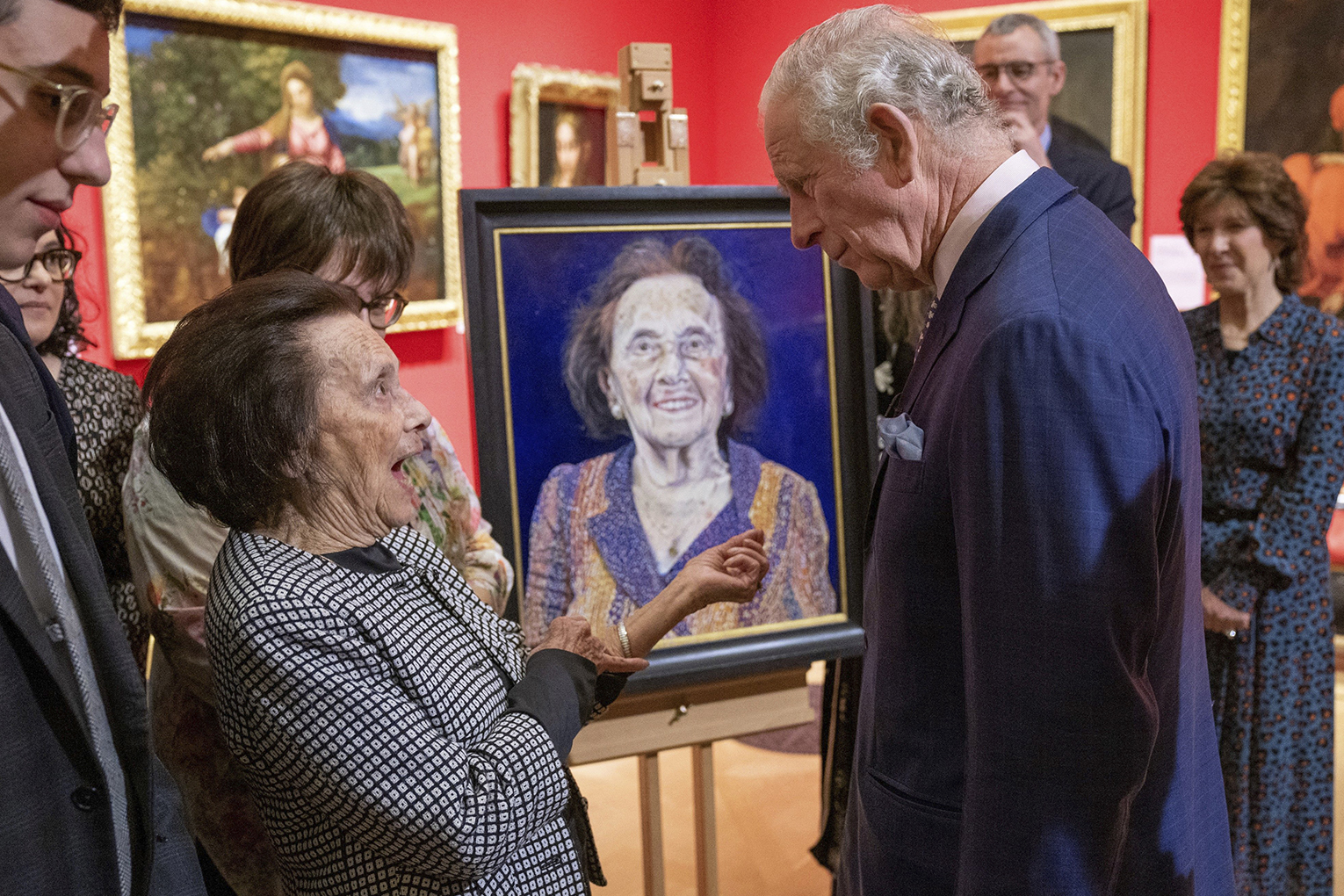
On a frosty and cold day in December, Lily Ebert walks along Bournemouth beach with her great grandson Dov Forman.
She’s on the south coast for her annual trip to Dorset, her family gathering with her to celebrate her 99th birthday.
Lily looks remarkably sharp for someone who was born in 1923 and she’s happy to spend time talking to other beachgoers, her smile beaming.
It doesn’t take them long to realise quite what an extraordinary woman they’re talking to.
Only a small tattoo on her arm would give it away but Lily is a Holocaust survivor and one of the world’s most foremost Holocaust educators.
An unexpected TikTok star during the pandemic, Lily gained a following of nearly two million people as she answered questions on her horrific experiences during World War II.
Born in Bonyhad in Hungary, Lily was the eldest daughter in a family of six children. She had a happy childhood in a loving environment.
When she was four, her mother gave her a gold pendant. It became Lily’s most prized possession.

The Jewish community in Bonyhad made up 14% of the population but they were put at risk by the rise of the Nazi Party in Germany in 1933.
In the 1930s, Hungary increasingly relied on Nazi Germany and Facist Italy to support the economy and policy had become stridently nationalistic by 1938.
Persecution of Jewish people started by the introduction of yellow stars, identifying Lily as ‘different’ to non-Jewish people.
In a TikTok video, she recalled having to sew the star to her clothes: “I remember getting the yellow star, and I remember having to sew it on because we could not go out on the street without it.
“We were punished when we would go without, and we were afraid.”
By 1938, the Nazis initiated organised attacks on the Jewish community in all Nazi territories and by 1941, Jews were routinely rounded up by Hungarian authorities and deported.
The policies made Lily and her family targets. Their prized possessions and belongings were ordered to be handed over to authorities and it was only the quick thinking of Lily’s brother Bela that saved the gold pendant, hiding it in the heel of her mother’s shoe.

Aged just 20, in July 1944, Lily was deported from her home alongside her mother, brother and three sisters and they were taken by train to the notorious concentration camp Auschwitz.
As they arrived at the camp, her mother, Nina, told her daughter to swap shoes with her, allowing Lily to keep the pendant that had become her only possession.
Greeted by Dr Mengele, the monstrous doctor working at the camp, they were ordered to stand in rows of five. Mengele ordered the various rows into two separate directions.
Lily and her sisters, Renee and Piri, were sent to the right while Nina, Bela and her sister Berta were sent to the left.
Tragically, those sent to the left were directed to the gas chambers and crematorium. Lily never saw Nina, Bela or Berta again.
Upon entering Auschwitz, Lily had her hair cut short while they were left with only their shoes, where her beloved pendant was kept.
When she learned what had happened to Nina, Bela and Berta, Lily became more determined to keep the pendant safe.
As her shoes became worn through, Lily began hiding the pendant inside her daily ration of bread to avoid detection from the guards.
Lily survived the camp for four months before she, and her two sisters, were transferred to an ammunition factory near Leipzig in Germany.
Leipzig was liberated by allied forces in 1945 and Lily moved to Switzerland, determined to make a life for herself. She married and had children, eventually being reunited with her remaining brother, Imre, in 1953.

She spent further time in Israel before finally settling in London. At first, she didn’t speak about the horrors she experienced in Auschwitz.
However, as time went on, she felt it was important to tell her story and during the pandemic, her great grandson Dov began telling her story on TikTok.
Speaking with incredible candour, Lily began answering questions on her experiences, as well as providing an insight into her life, and she’s earned nearly two million followers as a result.
In 2021, Lily and Dov authored Lily's Promise: How I Survived Auschwitz and Found the Strength to Live, which became a five-time Sunday Times Best Seller as well as Waterstones’ best history book of 2021. King Charles wrote the foreword.

Her work in Holocaust education saw her made an MBE in the 2023 New Year Honours List and she was awarded the Knight’s Cross of the Order of Merit of Hungary, one of Hungary’s highest national honours.
Lily and her family have been coming to Bournemouth since 2012, making the trip to the coast every year. Speaking in an email to afcb.co.uk, Dov revealed that Lily loves spending time talking to the locals and they enjoy the family environment in the town.
It's the community atmosphere that attracted Lily to the Cherries, as she attended her first game in the 2012 Boxing Day game against Yeovil Town.
Dov recalls it being a cold day at Dean Court, but Lily loved “seeing the family atmosphere at Bournemouth!” Lewis Grabban, Harry Arter and Brett Pitman scored in a 3-0 win for the Cherries.
Becoming a supporter of the club, Jaidon Anthony sent her a personal video message as she celebrated her 98th birthday last season.
Happy birthday, Lily! 🎉🎊
— AFC Bournemouth 🍒 (@afcbournemouth) December 29, 2021
We hear that you're a big #afcb fan, so wanted to send our very best wishes your way. @JaidonnA11 also has a special message to thank you for your support ❤️ pic.twitter.com/kytHbo1pBm
Last weekend's game with Nottingham Forest marked our annual Holocaust Memorial Day fixture, reflecting an event which is commemorated on 27th January, the day that Auschwitz was liberated.
The theme for this year’s Holocaust Memorial Day is ‘Ordinary People’, inviting us to consider the millions of ordinary people affected by the events of the Holocaust and the hundreds of communities which were destroyed or changed forever.
Lily might be one of ordinary people affected by the horrors of the Holocaust, but her story, legacy and impact is nothing short of extraordinary.
WHAT IS HOLOCAUST MEMORIAL DAY?
Today we remember the Holocaust, the murder of six million Jewish men, women, and children during the Second World War.
Between 1939 and 1945, Jews across Europe were forced into ghettos, separated from the rest of their towns and villages, starved, beaten, and deported to concentration and death camps where they were murdered. Other communities were killed in forests and other locations, close to where they had lived for centuries. The Nazis attempted to kill every Jew, wherever they could be found.
Britain and its allies fought the Nazis and in the final months of the war many soldiers witnessed horrific scenes as they liberated the camps. These memories stayed with them for the rest of their lives, and many veterans were never able to speak about what they saw.
After the war, several survivors, having lost parents and siblings, and having experienced unimaginable horrors, eventually came to Britain and rebuilt their lives. These people, who are now in their 80s and 90s, have made amazing contributions to British society, becoming teachers, dentists, architects, businessmen and even Olympic champions.
The crimes of the Nazis shook the world, and are remembered every year on Holocaust Memorial Day, 27th January, the day that the notorious concentration and death camp Auschwitz-Birkenau was liberated. On Holocaust Memorial Day, we remember the six million Jews murdered by the Nazis. We also remember other victims of Nazi persecution, including the Roma and Sinti community, homosexuals, disabled people, Jehovah’s Witnesses, and political opponents. We remember the atrocities of the past, and pledge to ensure that mankind does not repeat the same mistakes again.






